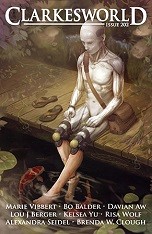“Cheaper to Replace” by Marie Vibbert
“Death and Redemption, Somewhere Near Tuba City” by Lou J Berger
“Estivation Troubles” by Bo Balder
“Clio’s Scroll” by Brenda W. Clough
“Tigers for Sale” by Risa Wolf
“Timelock” by Davian Aw
“What Remains, the Echoes of a Flute Song” by Alexandra Seidel
“The Orchard of Tomorrow” by Kelsea Yu
Reviewed by Chuck Rothman
The July issue of Clarkesworld shows a magazine at the top of its form.
“Cheaper to Replace” by Marie Vibbert has Hahn trying to squeeze more life out of her robot assistant James, which has more and more technical issues each day. It has indeed become cheaper to replace than repair, but Hahn refuses. She thinks of him as a friend and tries to find a way to keep him going. Strong emotional story that will resonate with anyone who had to deal with the possibility of losing a companion.
It’s all about AI in Lou J Berger’s “Death and Redemption, Somewhere Near Tuba City.” Elizabeth Mauldin is a bounty hunter, tracking down rogue AI trucks. There are only a few left, led by Big Bertha, sort of a Moby Dick figure. As the setup might imply, she eventually finds Big Bertha and a chase entails. Mauldin is extremely well drawn and Big Bertha is imbued with a strong personality, even without speaking. Excellent work all around. I especially liked the extrapolation that was several steps beyond merely looking at current trends.
“Estivation Troubles” by Bo Balder starts out with a strong and unusual concept. Stevie and Ammo are married crew members of a space freighter that is returning to their home planet after years in space (and even more years on their home planet). The world is divided into two groups: those awake in the summer and those awake in the winter. It’s summer and Stevie gets to see her family, but Ammo is a winter; his family is estivating. The story deals with the minor prejudices of the family—never overt, but always under the surface—and also further issues that strain the marriage. Strong in many aspects, but I thought the ending could have been better.
Brenda W. Clough’s “Clio’s Scroll” is historical science fiction set in 14th Century Italy about a somewhat immortal alien in a bottle named Asmidiske who asks the poet Dante for aid to rescue Ettore, one member of a family that has kept it alive for centuries. Asmidiske is from the future, sent backward in time and who has to live through the many years until it actually came to Earth without affecting history. The story is well-researched and, more importantly, not only brings life to the characters, but dovetails nicely into historical facts without contradicting them.
“Tigers for Sale” portrays a sentient space station that may be starting to become a little bit mad as it acts as keeper for a gateway to other universes and challenges them to a test of where they got their names and takes them all literally. When the ship Tigers for Sale approaches, the station asks if it has any tigers. Risa Wolf portrays the situation nicely, but I didn’t find the story working for me.
“Timelock” by Davian Aw is based on a process which suspends time within an area. The narrator lives next door to a group of people whose timelock impinges on his house. He goes to talk to the neighbors about it and gets caught inside, finding timelocks within the timelocks, leading him to different levels. It’s an attempt at a philosophical story, but I found it too outré to be engaging.
Alexandra Seidel’s “What Remains, the Echoes of a Flute Song” follows an unnamed itinerant flutist who comes upon an abandoned city, and, more importantly, a man who tried to drink some local water. It nearly killed him and the flutist rescues him and heals his wounds. The flutist does not speak, but communicates using his flute as they try to find a niche in the long-dead city. I liked the setup and the idea of the flutist traveling to survive, and also liked the concept that they spoke only through their flute. But the ending was a bit of a disappointment.
“The Orchard of Tomorrow” by Kelsea Yu has Andrea returning to his family’s peach orchard—now dead and barren—after eight years living in the capital and working in one of the greenhouses of the Dragons, rich people who run the country and ruin the farmers. Her old friend Lane is there, bitter because Andrea abandoned them after a fire. Andrea tries to explain the reason behind her decision by relating an old story they used to share. The relationship between the two is well portrayed, but I felt the ending was a little too facile and unlikely to work.
Chuck Rothman’s novels Staroamer’s Fate and Syron’s Fate are available from Fantastic Books.
 Clarkesworld #202, July 2023
Clarkesworld #202, July 2023